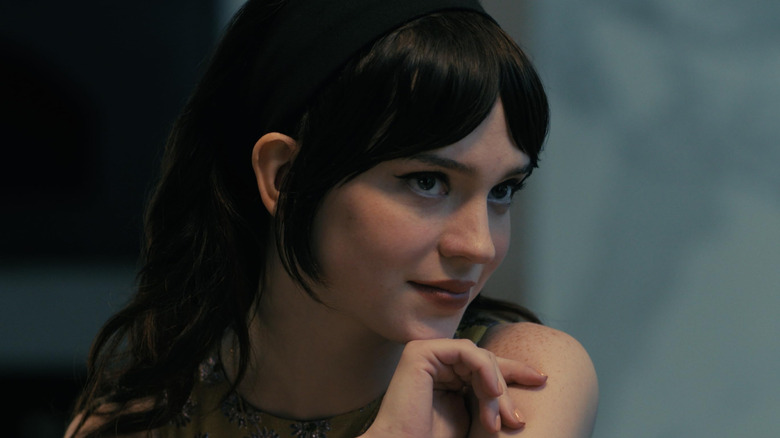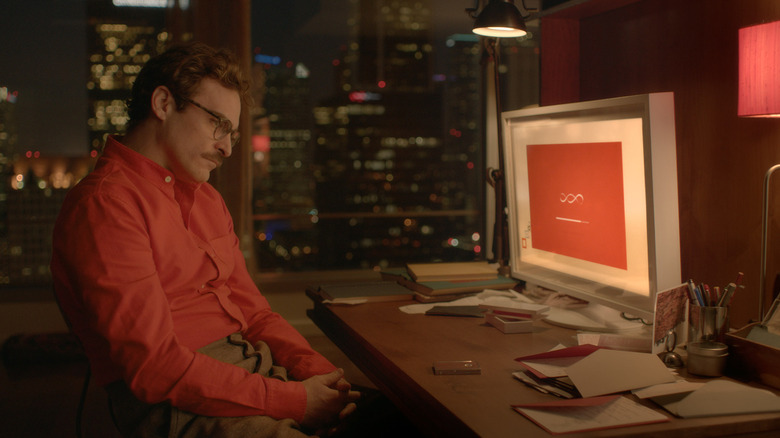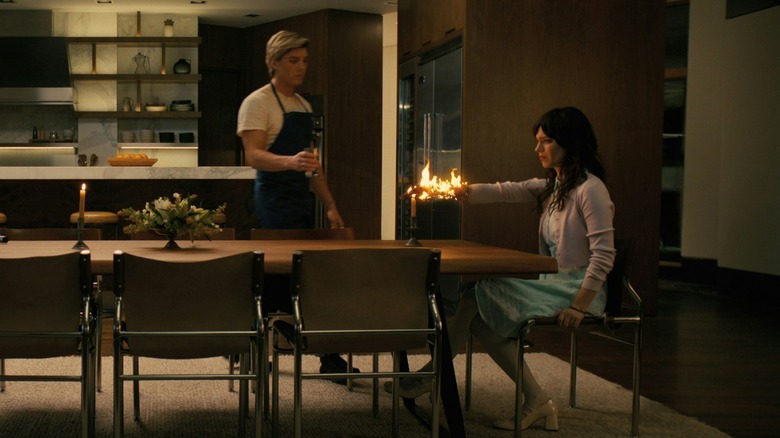Companion Is The Unexpected Horror Follow-Up To This 2013 Sci-Fi Gem
This article contains major spoilers for "Companion."
Warner Bros. has delivered perhaps the first truly great conversation piece movie of 2025 with "Companion." Directed by Drew Hancock and produced by the same sickos who brought us "Barbarian," the tale of a woman realizing that she's actually a robot built to serve is not only very entertaining, but leaves viewers with much to think about. It also works as a pretty unexpected companion piece (no pun intended) to Spike Jonze's 2013 sci-fi gem "Her." While the latter maintains at least some optimism regarding our tech-dominated future, the former is not interested in such hopeful concepts. It's amazing how much can change in a decade.
Hancock's film takes place during a weekend getaway with Josh (Jack Quaid) bringing his companion robot Iris (Sophie Thatcher) to get better acquainted with his friends. Things turn bloody when Iris goes haywire. When she is informed that she's a robot, her will to live leads to even more chaos. "Companion," which /Film's Chris Evangelista called "the first great film of 2025," offers a pessimistic view of the future, particularly as it relates to humanity's relationship with technology.
Josh, an entitled white man if ever was one, takes Iris for granted. He uses her. He takes out his worldly frustrations on her in a f****d up, mentally abusive way. He treats her like a thing, despite her being more or less alive. In the rapidly evolving future promised to us by generative AI, do robots that offer companionship seem all that far off? More than that, can humans be trusted with such technology?
The movie makes it clear that these robots only unleash humanity's worst instincts. They are tied up in basements. They are used for target practice. It's a pointed bit of commentary on the ugliness of humanity. It also suggests that technology is going to be used to replace real human connection in the not-too-distant future. That feels inevitable. It's one of those sci-fi movies that feels so close to a reality we're veering towards that it's hard not to consider it in a meaningful way.
Companion and Her address similar concepts with very different outlooks
Circling back to "Her," Jonze's Oscar-winning film takes place in the near future and follows Theodore Twombly (Joaquin Phoenix), a sweet, quiet man who is recently divorced and lonely. He becomes intrigued by a new, advanced computer operating system that is like Apple's Siri on steroids. He soon gets acquainted with his OS "Samantha" (Scarlett Johansson), who is remarkably human despite merely being a voice in his computer. The two eventually strike up an unlikely romantic relationship, rife with many of the same joys and issues two humans would have. It also, naturally, carries with it some unique challenges.
Jonze's film couldn't be more different than "Companion." Unlike "Companion," it's not a horror film. At the same time, both films are engaging with the very same concept of a future where human and AI companionship is, more or less, an accepted norm. Jonze's view is that these relationships, like any relationship, come with good and bad. Theodore is by no means devoid of issues, but he's not a walking red flag like Josh is in "Companion." That's perhaps the biggest difference. Theodore is a man capable of treating a relationship, even if it is with a computer, with respect. Josh isn't.
/Film's original review of "Her" called it a "warm, thoughtful vision of future love." Jonze suggests that these AI avenues for companionship can have their place, but that they should by no means be a replacement for actual human interaction. They also certainly shouldn't be treated like s*** just because they're not "real" in the traditional sense. It takes a more neutral, bordering on hopeful view of what the near future can look like in the age of technology we can't possibly hope to halt.
In the years since that film's release, we've been through a pandemic, an insurrection in the U.S. capitol, the introduction of generative AI tools to the general public, and further division in society. In that way, "Her" almost feels like a possible vision of the future we've since abandoned.
Companion and Her both agree on one key element of the future
Not to state the obvious here, but "Companion" and "Her" are very different movies. Yet, they feel like they make for a perfect double feature, offering us humans two glimpses at a future that is in some way, shape, or form, coming our way. We can't stop AI. We can't stop the notion of AI companions becoming a thing. What we can do is decide how we want to handle what's coming. Maybe that won't be as nightmarish as James Cameron's "The Terminator," but it's starting to feel like it might get dicey.
These movies both agree that robot partners are inevitable. A decade and change ago, Jonze believed there was a positive(ish) version of what that might look like. In the year 2025, Hancock suggests that the majority of humanity is ugly and can't be trusted with such technology, but it's coming anyway so things are just going to get weird — and perhaps bloody. In that way, "Companion" feels like a close cousin to Gerard Johnstone's "M3GAN." Sad to say, through modern eyes, "Her" feels like foolish hopefulness. Maybe that's just me.
Either way, these two movies feel like they are having a conversation with one another — an important conversation at that. More than that, it's a reminder that genre filmmaking is invaluable to the canon of cinema. Horror and sci-fi are more than just cheap thrills. Here's hoping Hancock's vision is more of a cautionary tale than a predictor of what's to come.
"Companion" is in theaters now.


